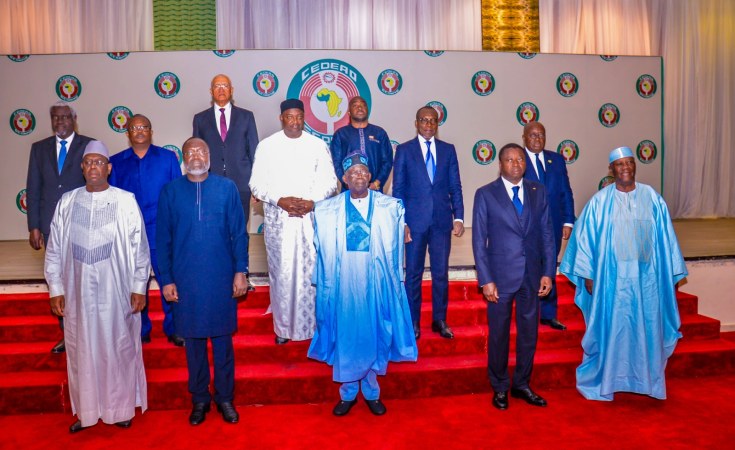The military junta in Niger has warned West African leaders meeting in Abuja against military intervention in the country's ongoing coup.
West African leaders met in the Nigerian capital Abuja on Sunday July 30, for an emergency summit on Niger, where a military coup took place earlier this week.
The heads of state of the 15-nation Economic Community of West African States (ECOWAS) could suspend Niger from its institutions, cut off the country from the regional central bank and financial market, and close borders. France and the EU have already suspended financial aid and security cooperation with Niger. The US says it will follow suit.
General Abdourahamane Tchiani, the head of the powerful presidential guard, declared himself the leader of Niger on Friday as the country's elected president Mohamed Bazoum has been held by the military for four days.
"ECOWAS and the international community would do everything to defend democracy and ensure democratic governance continues to take firm root in the region," president of Nigeria and ECOWAS chairman, Bola Tinubu, said in a statement on Friday.
In a televised statement on Saturday night, July 29, Niger's military leaders warned against any such military intervention by ECOWAS saying soldiers are ready to defend their homeland.
"The objective of the (ECOWAS) meeting is to approve a plan of aggression against Niger through an imminent military intervention in Niamey in collaboration with other African countries that are non-members of ECOWAS, and certain western countries," junta spokesperson Colonel Amadou Abdramane said.
"We want to once more remind ECOWAS or any other adventurer, of our firm determination to defend our homeland," he added.
The junta issued another statement calling on citizens in capital Niamey to come out into the streets Sunday from 7 a.m. local time (8 a.m. CET) and demonstrate against ECOWAS to show support for the new military leadership.
Niger is among the world's poorest countries and receives nearly $2 billion (€1.8 billion) a year in official development assistance, according to the World Bank.
Despite threats from the military Junta, ECOWAS has imposed additional restrictions on July 30 following the military coup in Niger.
Heightened security, protests, and business and travel disruptions are likely to persist in Niger in the coming days following a military coup on July 26. The National Council for the Protection of the Country (Conseil national pour la sauvegarde de la patrie, CNSP), led by General Abdourahmane Tchiani, has announced the removal of President Mohammed Bazoum.
In response to the coup, the Economic Community of West African States (ECOWAS) announced a no-fly zone, the closure of borders with Niger, and the suspension of commercial and financial transactions with Niger on July 30.
They have also given the CNSP one week to release and reinstate Bazoum. If ECOWAS' demands are not met ECOWAS will consider various options, including military intervention. The regional body's decision to implement travel restrictions follows the closure of the country's land and air borders following the coup. A nationwide curfew, originally 22:00-05:30, remains in place but has been reduced to 00:01-05:00.
Further coup-related protests are likely in Niamey and elsewhere. On July 30, hundreds of supporters of the coup gathered outside of the French Embassy in Niamey. The demonstrators chanted anti-French and pro-Russia slogans and threw stones at the embassy complex. Security forces dispersed the gathering with tear gas. Additional gatherings are likely near prominent government buildings, Western embassies, and public squares, including the French embassy, Presidential Palace, Place de la Concentration in front of the National Assembly, and President Bazoum's party headquarters. Clashes are likely if pro- and anti-CNSP groups demonstrate in proximity or if protesters engage in acts of public violence or ignore official orders to disperse.
Security will likely remain particularly tight in Niamey, major cities, and along the country's border crossings over the coming days. Security measures may include roadblocks, checkpoints, and searches of vehicles and pedestrians. Coup leaders could implement further restrictions, including restricting telecommunications. Clashes between supporters of Bazoum and military leaders could occur with little-to-no warning; a counter-coup attempt by soldiers loyal to Bazoum and his administration cannot be ruled out in the coming days. There have been no reported clashes involving armed forces as of July 30. Shortages of basic commodities are likely if the border closures persist.
The coup took place early July 26, when members of the Presidential Guard sequestered President Bazoum within the Presidential Palace. Bazoum was allegedly about to dismiss General Tchiani after the latter had served two presidential administrations. It was initially unclear whether the army supported the coup, but the latter sided with the coup members. A group of soldiers announced overnight July 26-27, that they had ended Niger's current regime and suspended the country's constitution. Tchiani, on July 28, justified the coup citing junta several issues, such as insecurity and the state of the economy, among other matters.
Consider avoiding travel until the situation stabilizes. Exercise extreme caution if operating anywhere in Niger; if operating in Niamey or major cities, shelter in place until the security situation stabilizes. Heed official directives, including curfew orders. Avoid government buildings, security installations, large concentrations of police and soldiers, and any demonstrations that materialize. Remain courteous and cooperative if approached and questioned by security personnel. Reconfirm transport services, including flight reservations, before leaving accommodations. Plan for possible disruptions to telecommunication networks. Refrain from taking photographs in public spaces due to heightened tensions nationwide. Stockpile essential items, including food, when possible. Maintain contact with diplomatic missions.


